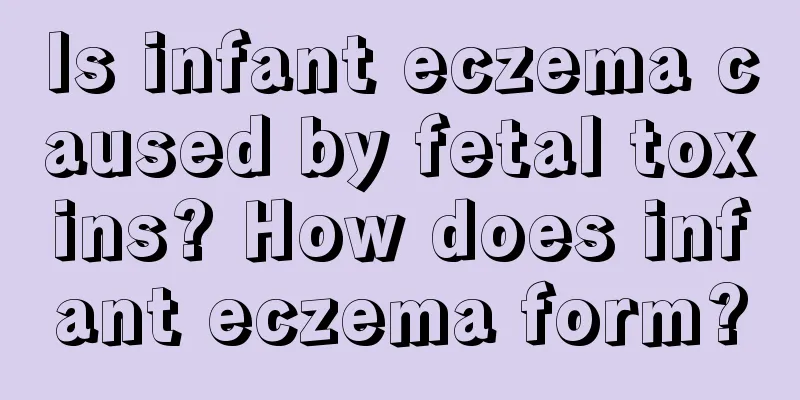Is infant eczema caused by fetal toxins? How does infant eczema form?

|
Usually, the skin of a newborn baby is very sensitive and fragile, so if the mother is not careful in taking care of the baby, the baby is likely to have problems such as eczema. So let's find out whether baby eczema is fetal toxins and how baby eczema is formed. Is baby eczema a fetal toxin?Childhood eczema is not fetal toxin. Infant eczema is mainly caused by skin allergies of the baby's skin and allergic constitution to various foods ingested, especially protein-containing foods and other foods, which often manifest as itching, wheals or blisters on the skin and other symptoms. Strictly speaking, eczema is an inflammatory skin disease that occurs in the epidermis or dermis of the human body, while fetal toxin is a traditional term in our folk. Fetal toxin is also divided into damp toxin and heat toxin. It manifests in infants mainly as scabies or acne, or scabies, which is completely different from eczema. Moreover, the treatment of fetal toxin is different from that of eczema. Eczema requires eczema ointment and local skin moisturizing. Fetal toxin requires dietary conditioning, local care, and anti-inflammatory treatment. How does baby eczema develop?1. Cow's milk protein is to blame. Most babies' eczema is mainly caused by allergies to the protein in milk powder or breast milk. Different babies will have different degrees of intolerance to protein, which often manifests as different degrees of eczema. In severe cases, diarrhea or even blood in the stool may occur. Generally, babies are only intolerant to cow's milk protein, but some babies are also intolerant to breast milk protein. For infants at high risk of milk protein allergy who cannot be exclusively breastfed, the use of partially hydrolyzed protein formula can prevent or delay the occurrence of early atopic dermatitis and milk protein allergy in infants and young children compared with conventional cow's milk protein formula. 2. Environmental factors, such as pollen, mites, and dry air, can all cause baby eczema. The woolen fabrics and even the dyes on the clothes worn by babies are also closely related to the occurrence of baby eczema. If the baby is dressed too thickly, eats too much, or the indoor temperature is too high, the eczema may be aggravated. 3. Emotional factors. Have you noticed that if your baby is emotional or even crying, the eczema on his body will be more obvious? That is because emotional factors can also affect the baby's eczema. If the baby is under long-term mental stress and has a bad mood, the eczema will be aggravated and even recur. 4. Genetic factors. Almost all health problems may be caused by genetic factors, and eczema is no exception. Among allergic diseases, only eczema occurs in infancy. In other words, if one of the parents has suffered from allergic diseases or eczema, the possibility of the baby getting eczema will greatly increase. What should I pay attention to when I have baby eczema?If your baby has eczema, you need to pay certain attention to it in daily life, especially since your baby's eczema has a certain exudative reaction. You should pay attention to keeping the local skin dry and clean. You can use talcum powder to apply it appropriately. Try to reduce the use of bathing products when bathing, and reduce the frequency of bathing. Try to keep the baby's living environment not too warm, and the temperature should not be too high when using the air conditioner. If your baby's eczema develops a generalized trend, you need to use certain medications to treat it. For example, you can apply hydrocortisone butyrate cream externally to control the inflammatory response of eczema. You should also try to avoid using some irritating products externally. How long does it take for baby eczema to heal?Baby eczema is also a common skin disease in clinical practice. It usually appears 1-3 months after birth, gradually alleviates after 6 months, and most patients can be cured after 1.5 years old. Therefore, baby eczema can generally be cured after 1.5 years old, that is, around 2 years old. During this period, if the patient has symptoms such as skin itching, scabs, and water discharge, active treatment should be given. First of all, it is necessary to manage the diet, especially protein foods, try to avoid eating less. For example, if you are allergic to milk, try to take a small amount after cooking; some are allergic to eggs, and you can eat egg yolks alone. Severe cases can be treated with antihistamines. |
>>: Is baby eczema caused by milk powder allergy? Will baby eczema caused by milk powder allergy
Recommend
Can baby's infectious diarrhea heal itself? How to treat baby's infectious diarrhea?
Infectious diarrhea is divided into bacterial inf...
Can teachers see students during online classes? What are the benefits of online classes?
Everyone must have heard of many ways of taking c...
How long does it take to recover from postpartum relaxation? How to recover from postpartum relaxation?
Generally speaking, pregnant women will experienc...
When is the best time to take the ovulation injection? When is the best time to take the ovulation injection?
Many women who are eager to have children will ch...
Can pregnant women drink longan and red dates tea? Can pregnant women drink these?
Longan and red dates tea is a very popular winter...
What are the benefits of eating goose eggs during pregnancy for the fetus? Can eating goose eggs during pregnancy cure jaundice?
I don’t know if you have ever eaten goose eggs. G...
What is the reason why children cannot concentrate? What elements are missing from children's lack of concentration?
Many children have difficulty concentrating. Why ...
What is Oxytocin? Precautions for using Oxytocin
Childbirth is a relatively dangerous process for ...
The difference between hand mask and hand wax. Which is better, hand mask or hand wax?
Have you ever used hand masks? Have you ever used...
Premature infant care points Premature infant care points
Premature babies are different from regular newbo...
What should I do if my child keeps coughing? How can I stop my child's cough quickly?
Children usually don't know how to take care ...
What are the newborn screening items and how much does it cost?
With the advancement of medical technology, many ...
Ingredients of Pigeon Mosquito Repellent Patch Is Pigeon Mosquito Repellent Patch safe?
Pigeon Mosquito Repellent Patch is a relatively w...
Can babies eat Chinese toon? How to cook Chinese toon for babies?
Many parents start feeding their babies some comp...
When is the best time for newborns to supplement calcium? When does the umbilical cord of a newborn fall off?
Newborn babies develop very quickly. Many parents...









